Episodes

Tuesday Sep 21, 2021
Tuesday Sep 21, 2021
In this teeny-tiny episode, I discuss how to think about quarterly taxes so that it's not quite so painful to send in those checks every few months.
Resources Mentioned
Happy Money by Ken Honda
My Roots course just re-opened. If you're getting started & need help setting up your practice (insurance, forms, scheduling, etc), come and join us!
Not sure how much you should be setting aside for taxes? Check out Episode 14 | How to Handle Income from your Practice
--- Send in a voice message: https://intheclinic.com
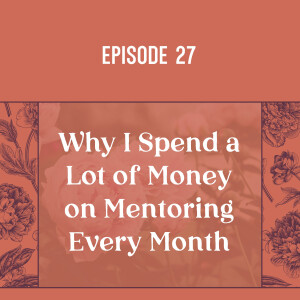
Friday Aug 06, 2021
Friday Aug 06, 2021
Why I Spend Money on Mentoring... and lots of it.
This week, I'm sharing specifically how much money I spend every month on mentoring.
Hint: it's an amount that would have been inconceivable to me a year or two ago.
It's an amount that doesn't feel entirely comfortable. It pushes me, which is part of the point.
When I first started practicing, I resisted spending money on mentoring and other "business building" things.
I didn't have money to spend, and a lot of these programs seemed scammy and unnecessary. (To be fair, many of them actually are.)
I wanted to focus on working with clients, and I didn't have any interest in being a business owner.
I pretty quickly realized that I do own a business, and simultaneously that I had no idea how to actually run one.
The limits of my own knowledge and experience became obvious.
When I started paying people who know more than I do to help me, things started to change.
Now I think of this money as 1) totally worth it for reasons explained in the episode, and 2) a way to symbolize my belief in myself and my own growth/expansion. When I pay people who are further down the line to help me grow ethically and thoughtfully, I know I'm saving myself time, energy, and heartache.
I hope having this peek behind the curtains of my practice is helpful for you. Please share your thoughts/feedback below or privately if you like!
Here's more about Monday Mentoring if you're interested in that program!
--- Send in a voice message: https://intheclinic.com
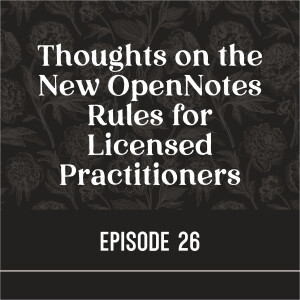
Friday Jul 02, 2021
Friday Jul 02, 2021
Why licensed nutritionists need to be aware of the new OpenNotes rules.
Did you know that new legislation went into effect in April, 2021 that affects the way licensed healthcare providers share information with their clients/patients?
It's called OpenNotes.
If you're in practice, it will affect how you communicate with your clients and potentially how you take notes.
Because it's still very new, we still don't know the full implications of OpenNotes for nutritionists.
At this point, most of us with private practices are doing our best to implement the changes as we understand them.
In this episode, I share a few thoughts on my understanding of the new OpenNotes rules that apply to licensed practitioners.
Please note that these are not meant to be a full and comprehensive guide to OpenNotes for licensed nutritionists, but rather reflections on some changes that I have implemented in my own practice based on the rules, and my interpretation of how they apply.
Consult a lawyer before making changes or decisions about how these rules apply to your own practice!
As mentioned in the episode, I've also written a full review of Practice Better software.
See my full review of Practice Better software.
Resources about Open Notes for Licensed Nutritionists
Federal Rules mandating open notes (this whole website is excellent)
More info about exceptions
FAQ noting that practitioners are not required to make notes available proactively, but only by request
Here's the full "information blocking" FAQ (see the rest of the HealthIT.gov website for additional info)
--- Send in a voice message: https://intheclinic.com

Tuesday Jun 01, 2021
Tuesday Jun 01, 2021
If you've ever felt bashful because you don't run an apothecary...
Check out this week's episode!
There are many different ways to be an herbalist.
Not everyone needs to fulfill each aspect of herbalism personally.
If you love running an apothecary, great!
If you don't love it, you don't have to do it.
If you don't have the time, or the money, or the ability to deal with it: that's fine.
There are plenty of amazing, ethical people and businesses who you can work with to supply herbs for your clients.
It doesn't have to be you.
You do you.
Work with your strengths & gifts.
Let go of what's not right for now.
Have a great week.
xo,
Camille
--- Send in a voice message: https://intheclinic.com
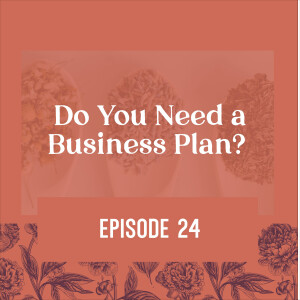
Wednesday May 05, 2021
Wednesday May 05, 2021
Do you need a business plan?
One of the things I get asked relatively often in my Roots course is whether you need to have a formal business plan before you open your private clinical practice as an herbalist or nutritionist.
The short answer: Nope. Not really.
In this episode, I share why I don't think you need one and a few things to consider instead.
Need help with some of these steps? You may want to consider my Roots course and/or a private mentoring session.
--- Send in a voice message: https://intheclinic.com
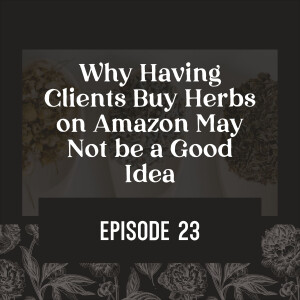
Friday Apr 23, 2021
Friday Apr 23, 2021
An interview with herbalist Lori Wroten
In this week's episode, you'll hear an interview with herbalist Lori Wroten. This is the first time I've had a guest on In the Clinic!
A cautionary tale
I invited Lori to share about a frightening experience associated with the use of an herbal product being sold by a 3rd party vendor on Amazon.
Although we don't have all of the details about what was in the product, this case study provides a cautionary tale about the quality and veracity of products that clients purchase online.
As you'll hear in the episode, it's not always clear on Amazon whether someone is buying a product directly from a merchant or whether it's coming from a 3rd-party seller (someone who is essentially buying the product directly from the manufacturer and then re-selling it.)
Although Amazon is taking steps to cut down on questionable 3rd-party sellers, it is still a bit of a wild card.
How to identify products sold by 3rd parties on Amazon
Note that there are many variations in terms of how products show up on Amazon. It can be difficult to figure out which are from a 3rd party.
If a product is being fulfilled by Amazon, that simply means that the seller sent the product to Amazon to store in their warehouse, and that Amazon will send it to you. As far as I know, Amazon doesn't inspect for quality/authenticity in this scenario.
If you're not sure, the best thing to do is to call the manufacturer to see where they recommend that you buy their authentic products.
Example of product being sold by Oregon's Wild Harvest via Amazon:
Because I already know & trust the quality of OWH, and because this product appears to be coming directly from OWH via Amazon, this seems legit to me. (I'd still rather buy it in a local store, though!)
Example of a MediHerb product being sold by a 3rd party
Here you can see this MediHerb andrographis product is being sold & shipping from "Brooklyn Dealz" (nothing against this company - I know nothing about them!). I'd be much more cautious about purchasing because a) I know that MediHerb is a practitioner-only line, and b) I don't know how BD got this product, how long they've had it, how they stored it, etc.
What can we do?
As practitioners, we need to educate clients about where to buy products safely. Although sometimes prices are cheaper on Amazon, if they're way under what you're seeing elsewhere online it makes sense to use caution & double-check the seller's info.
If anything seems off, contact the company to check that this is a legitimate product.
Also, if you are having clients purchase something online, I highly recommend that you link directly to the specific product you're recommending and/or use a dispensary like Fullscript or Wellevate (linked below) to make sure people are getting the correct & authentic product.
Specifically tell your client that they're welcome to get the product anywhere they like, and also explain why buying from 3rd party sellers is not a good idea.
Please see the resources below (+ some of our ideas in the podcast episode) for ideas about where clients can obtain high-quality supplements.
Resources
Read more about Lori Wroten and connect with her via her website: Lifesong Holistic
Amazon Warns Customers: Those Supplements Might be Fake (2019)
How to Spot Fake Supplements on Amazon (updated 2020)
Fullscript or Wellevate guarantee the quality/authenticity of products they sell & ship. If you're recommend vitamins/pre-packaged products for people who don't have access to a local health food store, I highly recommend one of these.
Local health food stores are also reasonable places to source herbs & supplements (although do check the quality of any bulk herbs, as they may deteriorate if turnover is low)
Your friendly local herbalist/herb shop
Bonus marketing tips
At the end of this episode, Lori tells us how she's built a thriving herbal practice. Be sure to listen to the end to find out how her practice has grown and some of the - quite unusual - strategies she used to spread the word about her work.
I hope you find this episode helpful.
If you have any tips that you share with your clients, please share them below or message me!
Take care,
Camille
--- Send in a voice message: https://intheclinic.com

Tuesday Apr 20, 2021
Tuesday Apr 20, 2021
Should you charge extra for payment plans?
When you purchase a course, program, or package online, you're often offered a payment plan - particularly if the price is on the high end.
Usually, the payment plan winds up being more expensive than the "paid in full" price.
An Example
A program costs $999 - or - four payments of $300
In this scenario, you'd be paying an extra $200 if you couldn't afford the upfront fee
Questions and Ethics
Are you comfortable penalizing someone who can't afford your full prices?
We do need to account for our own time and the admin work that can be associated with payment plans.
It's not necessarily wrong or bad to charge more for payment plans.
And, I hope that if you do you'll weigh the pros and cons and make an informed choice rather than choosing what you've seen done by default.
I'm asking you to think carefully about what the costs for you are, and whether you're comfortable passing those on to folks who are financially challenged or who have other reasons for needing/wanting to pay over time.
Your Decision
After you listen to the episode, I'd love to hear how you handle this in your own work.
Do you offer payment plans? If so, do you charge more if they're used? What factors influenced your decision?
You can comment below or message me!
Take care,
Camille
Other links mentioned:
Practice Better (referral link)
My Grow course, (start anytime!)
--- Send in a voice message: https://intheclinic.com
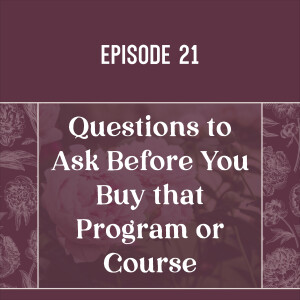
Sunday Mar 21, 2021
Sunday Mar 21, 2021
Do you have your eye on a course, program, or package that's starting soon?
There are endless tempting opportunities out there.
If you're anything like me, you probably receive messages daily about trainings or courses that seem like something you really, really should know about.
There are times when a course, training, or coaching package is just what you need.
Most of the time, these are not just what you need.
Before you purchase, ask yourself these questions:
Do I actually need this program/course right now?
Do I have time to do this program/course right now?
Can I afford this program or course?
Have I completed any other programs or courses that I purchased previously?
Am I using this course to procrastinate?
Ideally, you want to answer "yes" to the first three and "no" to the last two questions.
Otherwise, don't buy the course!
Not sure? Feeling that urge to click "buy now"?
Here's what to do:
Wait at least 24 hours.
Ask a mentor.
Ask your accountability group/partner.
Ask a colleague or classmate.
There are very few things - almost none, really - that are truly urgent when you're deciding whether to buy or not.
If you're feeling pressured, that's a good sign to take a step back and get a second (and third!) opinion.
Listen to my full suggestion list in this week's episode.
I hope this helps the next time a tempting offer comes through!
Let me know if you have any additional advice in the comment section below.
Take care,
Camille
--- Send in a voice message: https://intheclinic.com
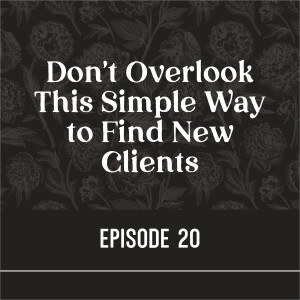
Wednesday Mar 17, 2021
Wednesday Mar 17, 2021
Are you having a hard time finding new clients?
When your schedule isn't booked and you're spirits are down, it's tempting to start grasping at straws.
Maybe you need to run Facebook ads?
Hire a pricey consultant?
Do some deep visualization?
Take another class?
Before you do any of these things, make sure you've tried the basics first.
If you're not getting clients, ask your self this: do the people who already love and support you know what you do? Have you told them about your work? Do they know who you work with and how to send people your way?
If not, this is an easy fix.
Start here, and you may be surprised at how things shift.
Getting More Support
If you're feeling stuck and having trouble taking action when it comes to finding clients, you might find my Grow course helpful.
Learn more here and sign up if it seems like a good fit! You can start any time. Grow is best for folks who have been in practice for at least a year.
--- Send in a voice message: https://intheclinic.com
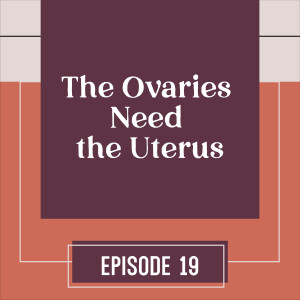
Friday Mar 12, 2021
Friday Mar 12, 2021
Do the ovaries work without the uterus?
Although the ovaries and uterus work hand-in-hand (so to speak), for a long time we've thought that ovarian hormone production would continue more or less unchanged if someone needed to have a hysterectomy.
It turns out that removing the uterus does affect ovarian function.
In this episode, I share some of the newer studies looking at how hysterectomy affects ovarian function & hormone production, as well as some outstanding questions to consider.
The key takeaway point?
It's all connected.
The uterus and the ovaries are likely in close communication with each other.
We don't fully understand this relationship yet, but it's logical and fascinating.
As we learn more about physiology, I imagine we'll continue to uncover obvious-in-retrospect ways that different organs, systems, cells, and tissues interact with one another.
In the meantime, I view this as more evidence that bodies are complex and that our herbal, nutrition, diet and other recommendations may be working via multiple pathways.
References
Atalay, M. A., Cetinkaya Demir, B., & Ozerkan, K. (2016). Change in the ovarian environment after hysterectomy with bilateral salpingectomy: Is it the technique or surgery itself? European Journal of Obstetrics, Gynecology, and Reproductive Biology, 204, 57–61. https://doi.org/10.1016/j.ejogrb.2016.07.483
Chun, S., & Ji, Y. I. (2020). Effect of Hysterectomy on Ovarian Reserve in the Early Postoperative Period Based on the Type of Surgery. Journal of Menopausal Medicine, 26(3), 159–164. https://doi.org/10.6118/jmm.20010
Iwase, A., Nakamura, T., Nakahara, T., Goto, M., & Kikkawa, F. (2014). Assessment of ovarian reserve using anti-Müllerian hormone levels in benign gynecologic conditions and surgical interventions: A systematic narrative review. Reproductive Biology and Endocrinology: RB&E, 12, 125. https://doi.org/10.1186/1477-7827-12-125
Moorman, P. G., Myers, E. R., Schildkraut, J. M., Iversen, E. S., Wang, F., & Warren, N. (2011). Effect of hysterectomy with ovarian preservation on ovarian function. Obstetrics and Gynecology, 118(6), 1271–1279. https://doi.org/10.1097/AOG.0b013e318236fd12
Singha, A., Saha, S., Bhattacharjee, R., Mondal, S., Choudhuri, S., Biswas, D., Das, S. K., Ghosh, S., Mukhopadhyay, S., & Chowdhury, S. (2016). DETERIORARON OF OVARIAN FUNCTION AFTER TOTAL ABDOMINAL HYSTERECTOMY WITH PRESERVARON OF OVARIES. Endocrine Practice: Official Journal of the American College of Endocrinology and the American Association of Clinical Endocrinologists, 22(12), 1387–1392. https://doi.org/10.4158/EP161215.OR
Trabuco, E. C., Moorman, P. G., Algeciras-Schimnich, A., Weaver, A. L., & Cliby, W. A. (2016). Association of Ovary-Sparing Hysterectomy With Ovarian Reserve. Obstetrics and Gynecology, 127(5), 819–827. https://doi.org/10.1097/AOG.0000000000001398
Yuan, Z., Cao, D., Bi, X., Yu, M., Yang, J., & Shen, K. (2019). The effects of hysterectomy with bilateral salpingectomy on ovarian reserve. International Journal of Gynaecology and Obstetrics: The Official Organ of the International Federation of Gynaecology and Obstetrics, 145(2), 233–238. https://doi.org/10.1002/ijgo.12798
--- Send in a voice message: https://intheclinic.com







